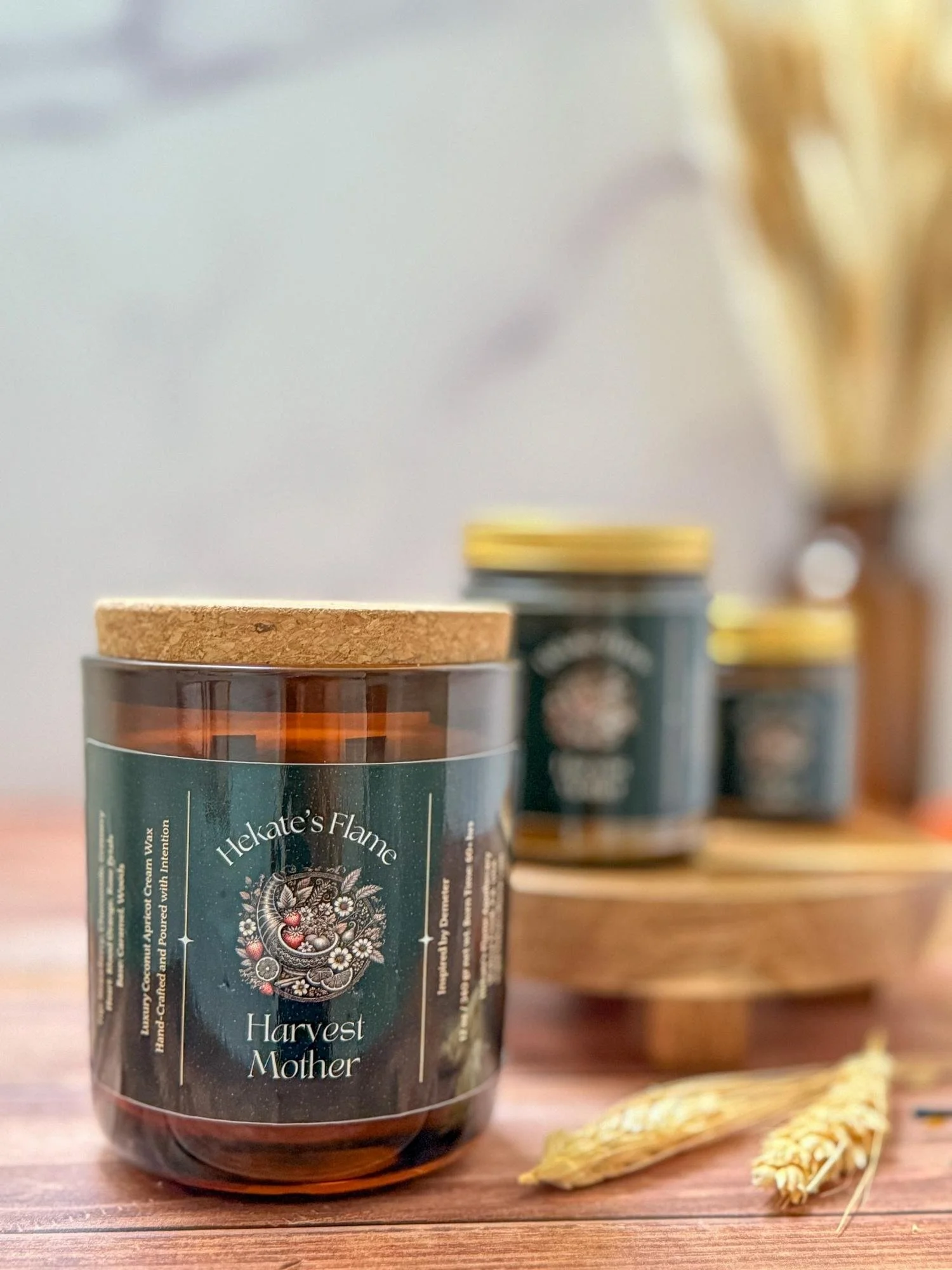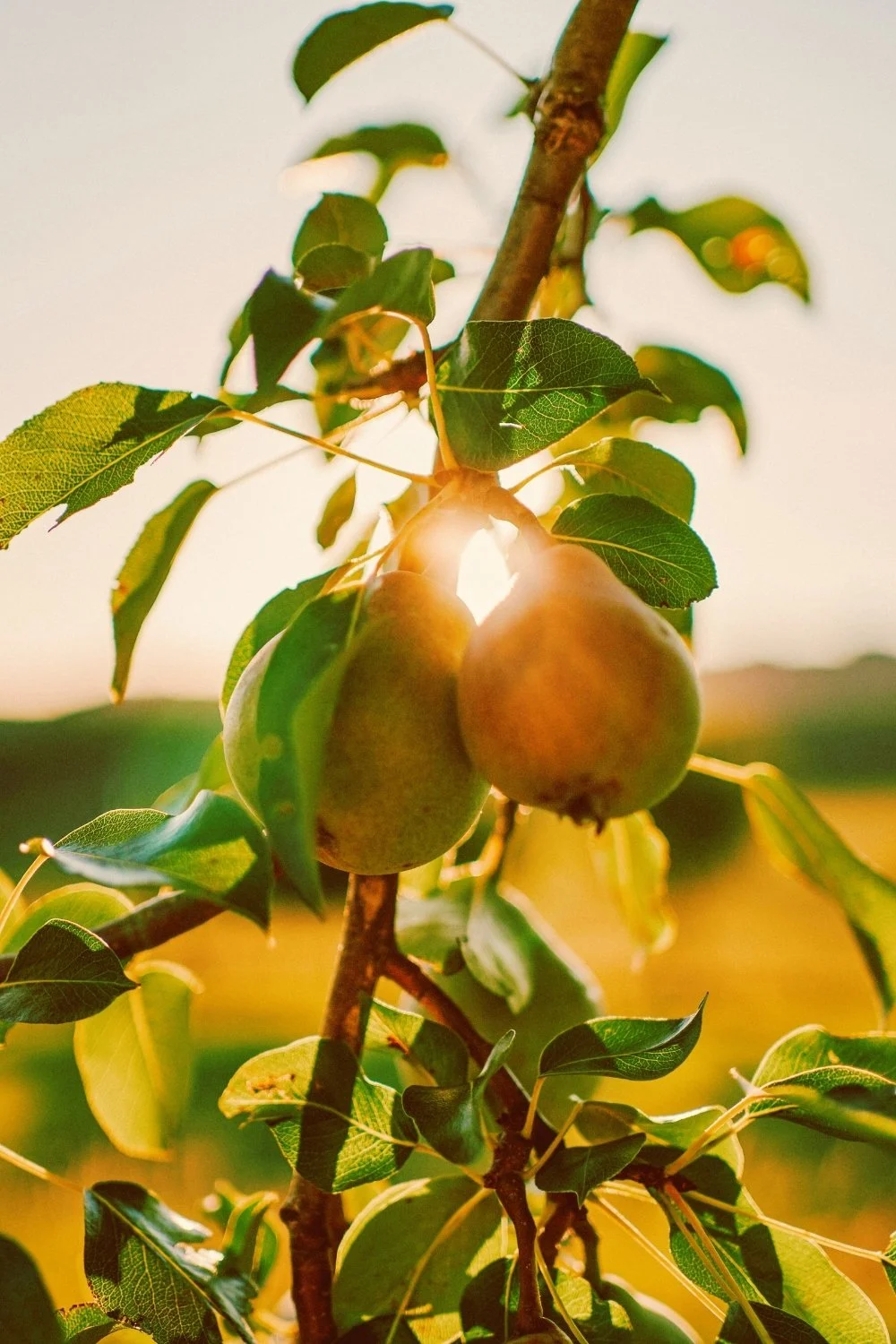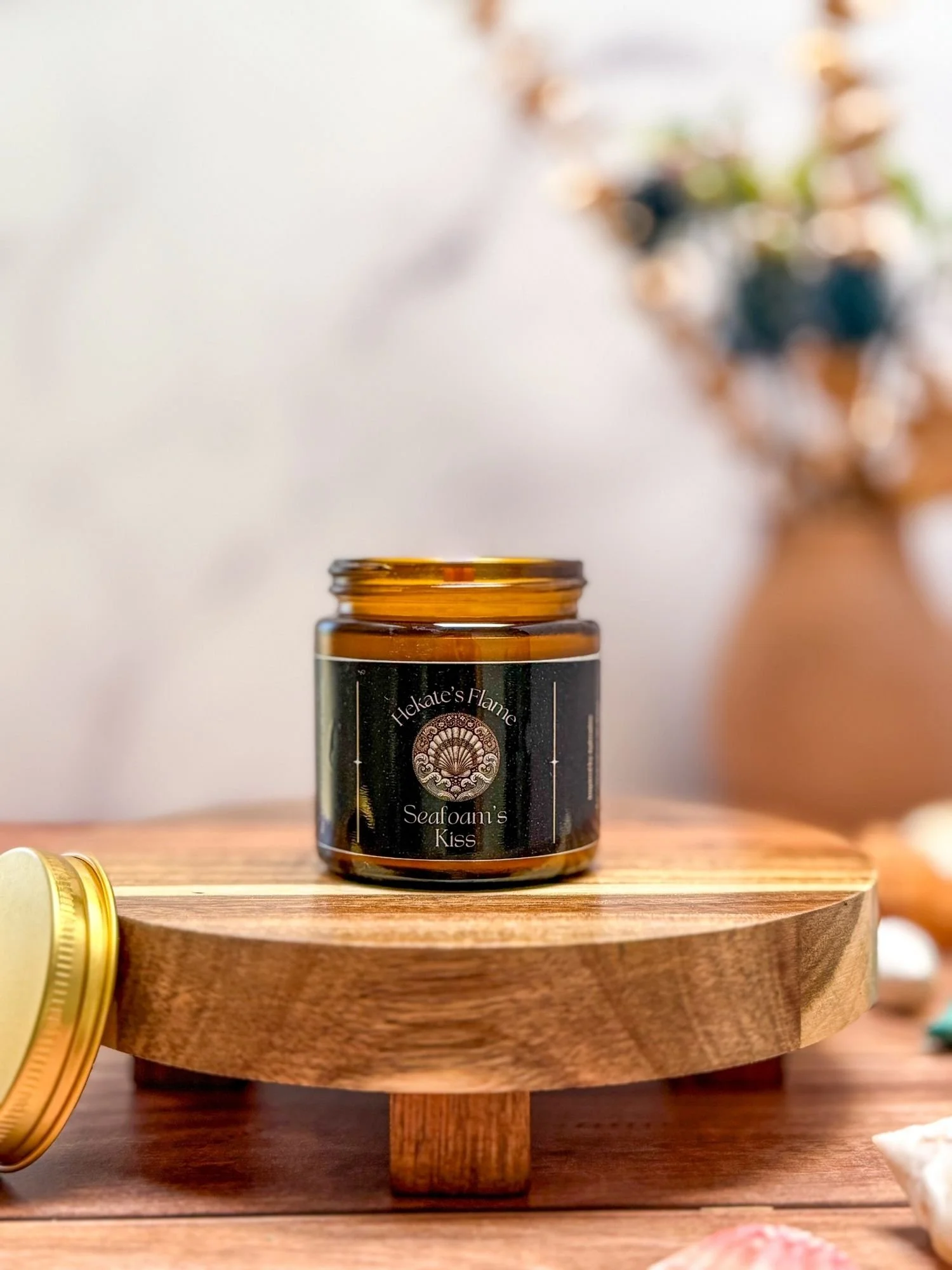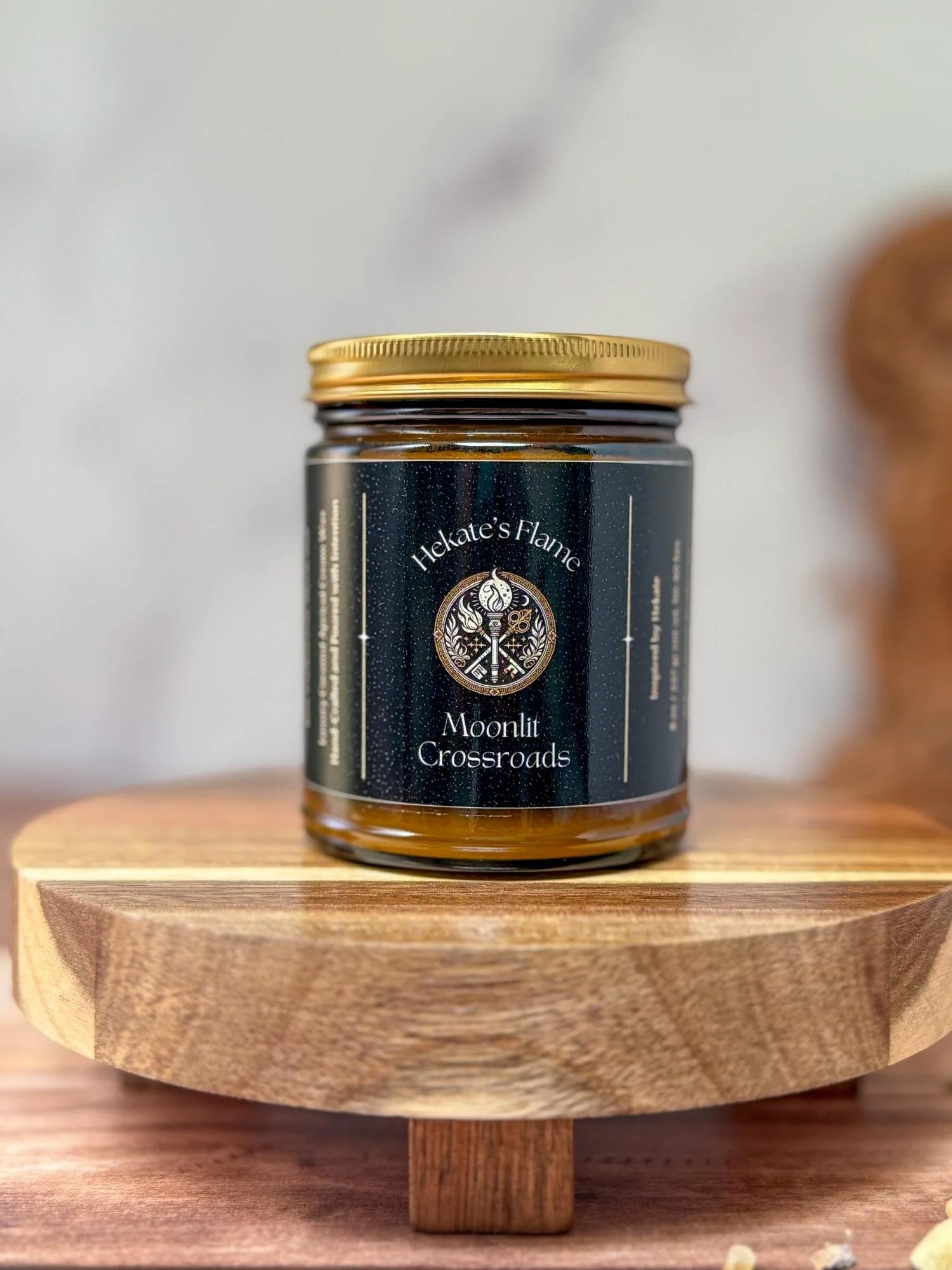‘Harvest Mother’: a handmade artisanal candle inspired by Demeter, the Greek goddess of the harvest, agriculture, and fertility of the earth
She who walks with the turning seasons and guards the golden harvest
Imagine sunlight over a field of grain, the air rich with warmth and promise. That is the heart of Harvest Mother: strawberry sweet as summer’s end, chamomile soft as a mother’s hand, and green leaves fresh with life. At its center, blood orange and rose glow with abundance and tenderness, while caramel and woods settle into quiet earthiness. A scent of nurture and renewal, honoring Demeter’s steady love and the eternal rhythm of giving and return.
Scent Notes:
Top: Strawberry, Chamomile, Greenery
Heart: Blood Orange, Rose Petals
Base: Caramel, Woods
🍁 Season Scent: Autumn
🍊 Primary Scent Family: Citrus & Fruity
🌿 Secondary Scent Family: Woody & Earthy
Please visit this blog post for more information on Scent Profiles, Top, Heart, and Base Notes.
Our candles are lovingly handcrafted in our home studio, Nimue’s Lair, nestled in Walnut Creek, CA. Each one begins with a luxurious blend of coconut-apricot wax, carefully infused with premium fragrance oils. Poured by hand into elegant glass vessels and amber jars, they’re finished with hand-cut labels and enchanted final touches. Every candle is a small ritual, infused with magick, intention, and the quiet glow of story.
-
12 oz Deluxe – Amber Aura Glass · Coco Apricot Wax
Burn Time: 60+ hours
Bold and enduring, this candle fills your space with myth and memory. Crafted for spacious sanctuaries, this candle shines in wide-open living rooms, high-ceilinged studios, and sacred hearths ~ places where scent is free to roam and the flame becomes a luminous companion to stillness and story.8 oz Classic – Amber Jar · Coco Apricot Wax
Burn Time: 50–60 hours
A perfect size for quiet corners and thoughtful pauses. Let it warm your reading nook, home office, or bedside altar, where its flame flickers like a whisper of intention.4 oz Petite – Amber Jar · Coco Apricot Wax
Burn Time: 20–25 hours
Small in size, rich in presence. This candle is ideal for travel, gifting, or sanctifying intimate spaces - guest rooms, personal altars, or quiet corners where scent and flame are invited to linger with intention. -
For detailed information about our waxes, wicks, fragrance blends, and vessels, please see our Ingredients & Materials Guide.
-
For guidance on how to tend your flame with care, ensuring the cleanest, safest, and most enchanting burn, please visit our Candle Care Guide.
-
Please visit the Shipping and Returns Information page for details.
-
All photographs, images, and written content on this website are original works of Hekate's Torch Apothecary, LLC (doing business as Hekate’s Flame Apothecary) and are protected by copyright. They may not be used, altered, shared, or reposted on any platform without explicit written consent. All label designs, photos, images, and content are the exclusive property of Hekate's Torch Apothecary, LLC.
For inquiries regarding the use of our content, please contact: care@hekatesflame.com
© 2025 Hekate's Torch Apothecary, LLC. All rights reserved.
Demeter: The Goddess of Grain, Motherhood, and Resilience
In Greek mythology, few deities held as much influence over the natural world and human survival as Demeter, the Olympian goddess of grain, fertility, and the harvest. As one of the six original Olympians born to Kronos and Rhea, Demeter's story is one of both nourishment and profound loss, embodying the cycles of life, death, and renewal.
Her mythology, especially the tale of her daughter Persephone's abduction, has captivated generations, offering lessons on grief, resilience, and the deep bond between mother and child. Demeter's role as a provider of sustenance and life places her at the heart of ancient Greek worship, primarily through cults like the Eleusinian Mysteries. But her mythology goes far beyond her agricultural gifts, as Demeter is a goddess who reflects both the nurturing and fierce aspects of motherhood.
Demeter's Origins: From Kronos to the Olympian Goddess of Agriculture
Demeter's lineage is both illustrious and deeply connected to the cycles of power and overthrow in Greek myth.
Born to Kronos and Rhea, she was swallowed by her father along with her siblings to prevent them from overthrowing him, a fear born from Kronos's own violent coup against his father, Uranus.
This cycle of familial betrayal is a recurring theme in Greek mythology, but Demeter's story takes a different turn once Zeus, the youngest of Kronos and Rhea's children, is born. Rhea, unwilling to lose yet another child to her paranoid husband, devises a plan to save Zeus by tricking Kronos into swallowing a stone instead. With time, Zeus grows strong enough to confront his father and, with the help of the goddess Metis, forces Kronos to regurgitate his siblings, including Demeter.
Once freed, Demeter becomes an Olympian goddess, residing on Mount Olympus alongside her siblings, including Zeus, Hades, and Hera. However, her early experiences of violence and betrayal lay the groundwork for her later mythology, particularly her reaction to the abduction of her daughter, Persephone.
Demeter's connection to the earth and agriculture also stems from her role as the provider of food and sustenance. The ancient Greeks believed that their ability to grow crops and feed their families depended on her goodwill. Her origins, however, may be traced back even further to Crete, where she was associated with Gaia, the Earth Mother, and Isis, the Egyptian goddess of fertility and the underworld. These associations reflected Demeter's role as a nurturer of life and a goddess connected to death and rebirth, much like her counterparts in other cultures.
Demeter and Persephone: The Heartbreaking Myth of Abduction and Grief
Hades' Deception: The Forced Union That Shaped the Seasons
The most famous and heart-wrenching story involving Demeter is the abduction of her daughter Persephone by Hades, god of the underworld.
Persephone, described as youthful and innocent, was lured by the mesmerizing bloom of the narcissus flower, which was deliberately placed to ensnare her. As Persephone strayed too far from her companions, the earth suddenly opened, and Hades, lord of the underworld, rose from the depths in his black chariot to seize her. This violent and traumatic act is often depicted in art, capturing the moment she was torn away from the life and light of the upper world.
Her cries echoed across the land and sea, but none would answer except for her mother, whose heart was pierced with sorrow. With the tacit approval of Zeus, Hades took Persephone as his queen in the underworld. The myth of Persephone's abduction is an allegory for the changing of the seasons and the cycle of life and death, but it also highlights the intense grief that Demeter experiences as a mother.
A Mother's Sorrow: Demeter's Relentless Search for Her Daughter
As Demeter searched tirelessly, she found few willing to offer help. However, the nymph Cyane, featured in Ovid's Metamorphoses, courageously confronted Hades as he took Persephone. Cyane reproached him, insisting he should have sought Demeter's permission and Persephone's consent before taking her. Hades, in response, angrily created an alternate path to the underworld by splitting the ground beside a river, disappearing with Persephone. So shaken by the event, Cyane dissolved into the waters, traumatized by her inability to prevent the abduction. This narrative highlights how, even within ancient sources, the actions of Hades were questioned and seen as unjust.
Hekate, the goddess of witchcraft and crossroads, played a crucial role in the search for Persephone. Hearing the cries of the young maiden, Hekate approached Demeter to offer her aid. Though she had not seen the abduction herself, Hekate's guidance led Demeter to the sun god Helios, who revealed the truth of Persephone's fate. In his attempt to comfort Demeter, Helios revealed that Zeus had sanctioned Persephone's abduction, arranging her marriage to Hades. Despite this, Helios urged Demeter to calm her anger, rationalizing that Hades was not an unworthy match for her daughter, even though he ruled the underworld.
This exchange further reflects a patriarchal notion in Greek mythology, where a young woman's fate is decided without her consent, and the union with a powerful male figure is deemed acceptable, even when taken by force. Such narratives highlight the control exerted by male gods over female autonomy, reinforcing a system where women's voices, even goddesses like Demeter, are subordinated to the will of male figures.
This dynamic mirrors the broader societal standards of ancient Greece, where women often had limited agency over their lives, marriages, and bodies. In this context, mythological stories such as Persephone's abduction can be seen as a reflection of the norms of arranged marriages, where consent was not always required, and women's roles were primarily defined by their relationships with men. The myths reinforced male dominance in both the divine and mortal realms, embedding these power structures into the cultural consciousness.
Grief and Devastation: How Demeter's Despair Brought Famine to the World
Nevertheless, Demeter's grief was all-consuming, as Persephone was forcibly taken against her will. Demeter's sorrow in this myth is not only the sorrow of a goddess; it echoes the universal anguish of any parent who has lost a child, whether to death, separation, or forces beyond their control. Her suffering transcends the mythological and touches on the deeply human experience of loss, a grief so powerful that it can halt the natural order.
Just as many who grieve may feel their world stop in the wake of a profound loss, Demeter's despair causes the earth itself to fall into a barren, lifeless state.
Upon discovering her daughter's disappearance, Demeter embarks on a relentless search, wandering the earth in mourning. Her sorrow is so great that she neglects her duties as the goddess of grain and fertility, causing a great famine that threatens to wipe out humanity. This catastrophic response underscores Demeter's immense power, not just over agriculture but over life itself. It also mirrors the consuming nature of grief, where the ability to focus on anything beyond the loss feels impossible. Without her, crops cannot grow, and humanity cannot survive. Demeter is willing to let the world wither away in her grief, reflecting the depth of her love for Persephone.
A Jealous Zeus and Demeter's Mortal Love
While centered around her maternal bond with Persephone, Demeter's mythology also touches on her rare romantic entanglements. One such story is her relationship with the mortal Iasion. Unlike many gods, who frequently pursued mortals, it was uncommon for goddesses to do so. However, Demeter was drawn to Iasion, and the two became lovers during Kadmos and Harmonia's wedding.
While they enjoyed their time together in a field, Zeus, ever-jealous, noticed the union. His possessiveness and irrational anger got the best of him, and he struck Iasion dead with a thunderbolt. This incident reveals Zeus' deep-seated insecurity, especially regarding his siblings' relationships, and highlights the violent and capricious nature of the king of the gods. While Demeter grieved the loss of Iasion, she bore him two sons, Ploutos (Plutus,) the god of wealth, and Philomelus, the god of agriculture and husbandry.
Demeter and Poseidon: The Myth of Transformation and the Birth of Despoina
Demeter's mythology also intersects with that of Poseidon, her brother. In the earlier Bronze Age tales, Poseidon was a water spirit, often depicted as a horse. In one myth, Poseidon becomes infatuated with Demeter and pursues her relentlessly. To avoid him, Demeter transforms herself into a mare and hides among a herd of horses. Not to be deterred, Poseidon transforms into a stallion and mates with her, leading to the birth of Despoina, goddess of mysteries, and Arion, the swift and divine horse.
This myth presents disturbing implications, reflecting an early portrayal of the gods where divine figures pursued desires without regard for consent, reinforcing themes of power and domination that resonate uncomfortably with modern sensibilities. It also reflects an earlier and more primitive version of the gods, where transformations and unions with animal forms were common. Despoina, who remains a mysterious figure in Greek mythology, is closely tied to the Eleusinian Mysteries and appears in the initiations alongside her mother. This dual nature of Demeter, as both a nurturer and a figure involved in darker, more mysterious rites, shows the goddess's complex and often paradoxical nature.
Demeter's ties to the underworld are also reflected in her worship as "Demeter Chthonia," a title emphasizing her connection to death and the earth as the final resting place of all life.
As Demeter brings life through the harvest, she also receives the dead back into the earth, representing her omnipresent power over the natural world. In some places, the dead were even referred to as the "Demetrioi," indicating how Demeter's presence touched every aspect of existence, from life's first breath to its final rest.
Demeter and the Eleusinian Mysteries: A Sacred Festival of Life, Death, and Rebirth
The Eleusinian Mysteries, held annually in Eleusis, just fifteen miles from Athens, were among ancient Greece's most revered religious rites. For over 2,000 years, this solemn festival was celebrated in gratitude for Demeter's gift of agriculture to humanity. The Mysteries were so esteemed that some considered them more important than the Olympic Games.
Their egalitarian nature set the Eleusinian Mysteries apart: men and women from all classes could participate, ensuring no distinction between rich and poor. Participants believed that initiation into these sacred rites earned them special privileges, including happiness, success, and favorable treatment in the afterlife. However, the ceremonies were shrouded in secrecy, with strict punishments for those who revealed the rituals.
The origins of the Mysteries are deeply intertwined with Demeter's personal journey. As the myth recounts, Demeter's search for Persephone eventually leads her to the town of Eleusis, where she disguises herself as an older woman and is taken in by King Celeus and his wife, Queen Metaneira.
While staying with the royal family, Demeter took their son, Demophon, under her care. In an effort to make him immortal, she secretly fed him ambrosia and placed him in the hearth's fire to burn away his mortality. One night, as she performed this sacred ritual, Metaneira, the boy's mother, walked in and screamed in terror at the sight of her child in the flames. Startled by the interruption, Demeter revealed her true form, and her divine radiance filled the hall, leaving everyone in awe. She then commanded the people of Eleusis to build a temple in her honor, which became the center of the Eleusinian Mysteries.
The Eleusinian Mysteries, which honored Demeter and Persephone, were shrouded in secrecy but are believed to have symbolized the eternal cycle of life, death, and rebirth. These rites embodied Demeter's dual gifts to humanity: the abundance of the harvest and the hope of an existence beyond death. Initiates were said to undergo a profound spiritual transformation, gaining deeper insights into the connection between mother and daughter, life and death, and the natural world's continuity. Through these sacred rituals, Demeter was revered as the provider of crops and as a goddess who promised life after death, making her worship essential to both physical sustenance and spiritual renewal.
Before these famous rites were established, Demeter's worship was rooted in earlier fertility rituals, such as the Thesmophoria, a festival observed by women that celebrated the cycle of life and death. The Thesmophoria, which involved fasting, sacrifice, and celebration of renewal, foreshadowed the Eleusinian Mysteries. Through these rites, Demeter was revered as both the provider of crops and a protector of life's continuity, offering physical sustenance and spiritual nourishment.
Demeter's Power Over Zeus: How the Goddess Held the Fate of Humanity
Demeter's control over the seasons is closely linked to her unique leverage over Zeus, a dynamic rarely seen in Greek mythology. Normally omnipotent, Zeus finds himself powerless against Demeter's fury when she refuses to let crops grow, threatening humanity's survival unless her daughter Persephone is returned.
As Demeter mourns, the once fertile earth becomes a barren, frozen wasteland where no seed can sprout. Her withdrawal from Olympus not only brings agriculture to a halt but also endangers humanity's very existence, demonstrating her unrivaled influence over life and death. Faced with this crisis, Zeus has no choice but to meet Demeter's demands, knowing that humanity's extinction would also bring an end to the sacrifices that sustain the gods' power.
This myth underscores the delicate balance between divine authority and human worship. Though Zeus is king of the gods, his power is not absolute. The gods depend on human devotion and offerings, and Demeter's ability to withhold her blessings from the earth threatens this divine order, solidifying her powerful grip over Zeus and the survival of humanity.
Demeter and the Pomegranate Seed: How Hades' Deception Shaped the Seasons
In a subtle yet insidious act of manipulation, Hades secretly fed Persephone a pomegranate seed, fully aware that consuming food in the underworld would bind her to his realm. The key word here is "lathra," meaning secretly, underscoring the deception that ensured Persephone could never fully return to the world above, effectively trapping her between two worlds.
This manipulation adds another layer to the complex themes of control and dominance woven throughout the myth, where women are not only taken by force but also tricked into submission. Hades' later attempts to paint himself as a "worthy husband" reflect not only his deceit but also the underlying patriarchal norms of Greek mythology, where powerful male figures assert control over women, justifying their actions as noble, even when achieved through force and manipulation.
As a result, Demeter's grief becomes more than a personal struggle; it symbolizes a cosmic imbalance, with nature itself reflecting her emotional devastation. The manipulation of Persephone ties directly to the changing of the seasons: when Persephone resides in the underworld, Demeter mourns, causing the earth to become barren, marking autumn and winter. Conversely, when Persephone returns to the surface, Demeter rejoices, and the earth flourishes again, bringing spring and summer.
Persephone's movement between the underworld and the earth reminds us of life's fragility and inevitable change. Demeter's ability to restore fertility reflects the hope that even profound loss can lead to renewal. Yet, though Persephone rises from the underworld each spring, she is forever altered by her time below. The carefree maiden who once danced among flowers now carries the shadow of the underworld, a reminder of life's fleeting beauty before it returns to the earth.
This cycle of death and rebirth underscores the agricultural rhythms essential to ancient Greek life and offers a metaphor for the human experience of loss and renewal. For the Greeks, Demeter's control over the seasons and the fertility of the land made her one of the most revered and feared deities in the pantheon. Her power extended beyond the natural world, influencing the fate of humanity itself. Ultimately, the myth reminds us that nature's cycles are deeply intertwined with the emotional and spiritual struggles of the gods, much like how humans find meaning in both the impermanence and beauty of life.
Demeter and Persephone: A Myth of Maternal Love, Grief, and Renewal
At the core of Demeter's mythology lies not just the changing of the seasons or humanity's survival but the profound and unwavering love between a mother and her child. Demeter's grief over Persephone's loss consumes her so profoundly that she is willing to let the world perish if it means being reunited with her daughter. This myth paints a poignant and raw picture of the lengths a mother will go to in protecting, searching for, and caring for her child. The natural order itself becomes secondary to the overwhelming pain of separation, a testament to the all-encompassing power of maternal love.
Demeter's journey is not simply one of resilience or eventual renewal but rather of sacrifice and an unrelenting determination to reclaim what has been taken from her. Her true strength lies not in her control over the harvest but in the emotional depth of her connection to Persephone. It is this fierce, boundless love that compels Demeter to hold the world hostage until her daughter is returned, illustrating that no force, divine or mortal, can stand against a mother's devotion.
In the end, Demeter's reunion with Persephone is bittersweet. Though she must share her daughter with the underworld, the mere joy of having her back, even for part of the year, is enough to revive the earth. While the Olympians often seemed removed from human suffering, Demeter and Persephone embody a deeper understanding of sorrow and loss. Demeter, the grieving mother, and Persephone, the maiden touched by death, became lasting symbols of compassion in a transient world. Their story reminds us that the bond between mother and child endures even through the most tragic separations, offering fleeting moments of joy and light amidst the darkest times.





To Demeter Eleusinia. O universal mother, Deo famed, august, the source of wealth, and various named: great nurse, all-bounteous, blessed and divine, who joyest in peace; to nourish corn is thine. Goddess of seed, of fruits abundant, fair, harvest and threshing are thy constant care. Lovely delightful queen, by all desired, who dwellest in Eleusis' holy vales retired. Nurse of all mortals, who benignant mind first ploughing oxen to the yoke confined; and gave to men what nature's wants require, with plenteous means of bliss, which all desire.






























































































